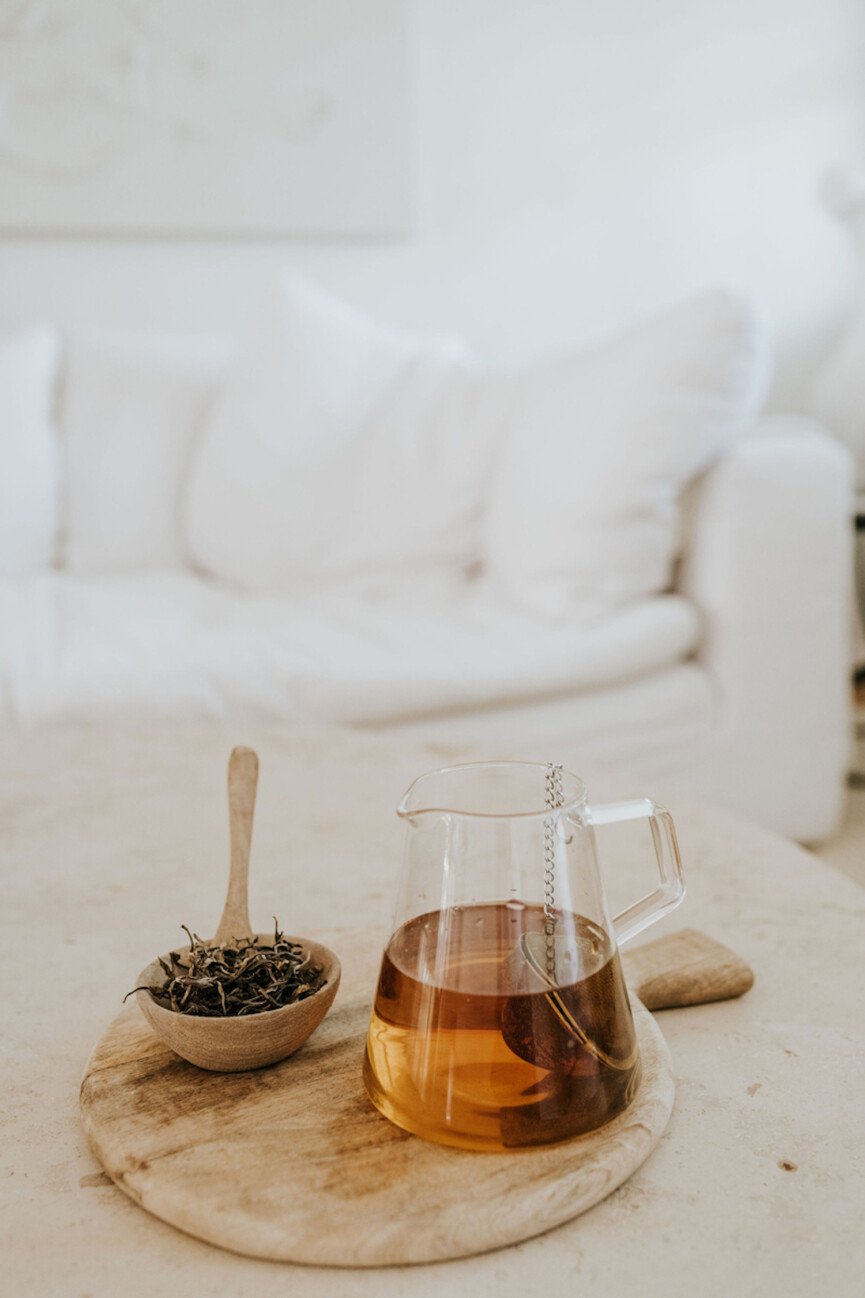If you’re no stranger to a bloated, uncomfortable belly, you know finding reliable relief can feel like an uphill battle. Fortunately, the solution to your stomach woes could be a mug of tea away! That’s right. Sipping on a supportive tea can do wonders: ease bloat, nurture a tender tummy, and so much more. (Tea for boosted energy? I think yes!) From calming chamomile to zesty ginger, we’ve determined the best tea for digestion.
Whether or not you’re a ritual tea drinker, there’s just something about a warm cup of tea that most of us can’t resist. From British high tea to fika with friends—there’s always a reason to put the kettle on. Get ready to discover your new go-to brews for a happy tummy. Steep your way to a stable stomach.
Featured image from our interview with Mary Ralph Bradley.


The Tea on Tummy Troubles
Digestive issues are extremely common. According to the National Institute of Diabetes and Digestive and Kidney Diseases, about 70 million Americans suffer from digestive diseases. Yikes. These issues can range from mild discomfort to more serious conditions, such as lactose intolerance, irritable bowel syndrome (IBS), and gastroesophageal reflux disease (GERD). Digestive woes can have a significant impact on overall health and quality of life.
How Tea Can Improve Digestion
Along with supportive lifestyle habits, ruling out intolerances, and being mindful of sneaky ingredients that can cause bloat, tea is very beneficial for digestion.
- It aids in hydration. Adequate hydration is necessary for reducing the risk of constipation.
- It stimulates digestion. Many types of tea contain catechins, tannins, and caffeine. All of these can increase the production of digestive enzymes, helping break down food more efficiently. These stimulants can also relieve symptoms like bloating and gas. Win-win.
- It relieves stomach discomfort. Herbal teas (chamomile, fennel, etc.) can relieve symptoms like cramping and nausea thanks to their ability to relax the digestive tract.
- It supports good bacteria. Green and black teas contain polyphenols to help nourish beneficial bacteria in the gut.
Can tea reduce inflammation?
Yes! Certain teas, such as ginger and turmeric, contain anti-inflammatory compounds that can help reduce inflammation in the gut. Enter: polyphenols. Polyphenols not only give teas their distinct flavor and aroma, but they’re also known for their health-promoting properties.
Research is still evolving, but promising studies show that regular tea consumption can reduce markers of inflammation. Green tea in particular has been studied extensively for its potential anti-inflammatory effects, attributed to its high content of EGCG—a potent polyphenol.

The Best Tea for Digestion Support
Tea isn’t just a delicious beverage—it can also be a powerful aid for digestion. For centuries, tea has soothed both physical and emotional ailments alike. Certain types of teas can help soothe digestive discomfort and improve overall gut health. Below are 10 types of teas known for their digestion-boosting properties.
Ginger Tea
Ginger has long been used to aid digestion, and ginger tea is an easy way to incorporate this powerful root into your diet. Ginger tea can help relieve nausea, bloating, and other digestive issues. It also has anti-inflammatory properties that can help reduce inflammation in the gut.
To make: Boil two tablespoons of sliced ginger in two cups of water for 10-20 minutes. Strain before drinking. Alternatively, steep a ginger tea bar in one cup of boiled water. Cover and steep for 10-15 minutes.
Peppermint Tea
Peppermint is also widely considered the best tea for digestion. It can help soothe bloating, gas, and other discomforts thanks to its ability to relax the muscles in the digestive tract. It also has a refreshing taste for a nourishing pick-me-up on a sluggish day.
To make: Bring water to a boil and steep for seven minutes. For fresh peppermint tea, steep 5-10 peppermint leaves in boiled water for 10 minutes. Strain and sip.
Chamomile Tea
Chamomile tea is known for its calming properties, but did you know it can also help with digestion? Chamomile has anti-inflammatory and anti-spasmodic properties. In essence, this means it can soothe the gut and reduce inflammation. This tea has a mild, pleasant taste, making it a relaxing choice before bed. Sip and unwind.
To make: Bring one cup of fresh water to a boil. Pour over the tea bag into a mug. Brew for five minutes.
Fennel Tea
Because it’s fiber-rich, fennel is fantastic for minimizing bloating and gas. It has a mild, slightly sweet taste—enjoy it with a healthy lunch!
To make: Into a mug, pour one cup of boiled water over a tea bag. Cover and steep for 10-15 minutes.
Dandelion Tea
Dandelion tea is often used to support liver function, but it can also soothe stomach woes. It has natural diuretic properties that can help reduce bloating and water retention. It also contains inulin, a type of prebiotic fiber that can help feed beneficial gut bacteria.
To make: Bring water to a rolling boil. Into a mug, pour six ounces of water over the tea bag. Steep for 5-7 minutes.
Lemon Tea
Lemon is always a refreshing choice. Bonus points: it helps with digestion. Lemon contains citric acid, meaning it stimulates the production of stomach acid and digestive enzymes. Its bright, tangy flavor will perk you up on a sluggish day.
To make: Steep one tea bag or 1.5 tablespoons of loose-leaf tea in 12 ounces of 195ºF water for four minutes.
Licorice Tea
Have you tried licorice tea? Popular across Europe and Asia, it’s another supportive choice when you’re dealing with digestive discomfort. Like ginger and turmeric, it has natural anti-inflammatory properties to reduce inflammation in the gut. It can also help soothe heartburn and other acid reflux symptoms. Note that licorice should be consumed in moderation, as it can have side effects.
To make: Bring water to a boil and steep tea bag for seven minutes.
Cinnamon Tea
Calling all cinnamon enthusiasts (ahem, us!). Cinnamon has natural anti-inflammatory properties that can help reduce inflammation in the gut. It can also help regulate blood sugar levels, which can help prevent spikes and crashes that can lead to digestive issues. Cinnamon tea has a warming, comforting flavor that makes it a great choice on chilly days.
To make: Bring one cup of water to a boil. Pour water into a mug over the tea bag and steep for five minutes.
Turmeric Tea
Turmeric has natural anti-inflammatory properties that can help reduce inflammation in the gut. It also contains curcumin, a powerful antioxidant that can help support overall health. Turmeric tea has a slightly spicy yet earthy flavor—pair your cuppa with a nourishing sweet treat.
To make: Pour eight ounces of freshly boiled water over a tea bag into a mug. Cover and steep for 10-15 minutes.
Green Tea
Last but not least, green tea. Green tea is widely known for its antioxidant properties, but it can also aid digestion and energy. As mentioned, green tea contains catechins, a type of antioxidant that can help reduce inflammation in the gut. It can also help stimulate the production of digestive enzymes. Try this green tea from the Himalayas. It’s pure, smooth, and slightly sweet.
To make: Heat eight ounces of water to 180ºF. Steep tea bag for three minutes.

More Holistic Remedies to Improve Digestion
In addition to working alongside your healthcare provider or a gastroenterologist, there are a variety of natural and holistic remedies that can help improve digestion and relieve a variety of symptoms. Here are a few tried-and-true antidotes to digestive woes.
Probiotics
Hello, live bacteria! Probiotics are powerful. They help improve digestion, reduce inflammation, and more. Fermented foods, such as yogurt, kefir, and kimchi, naturally contain probiotics. Or, you can ingest probiotics in supplement form.
Fiber
No surprise here. A diet high in fiber can help promote regular bowel movements and improve digestion. Fruits, vegetables, whole grains, and seeds are all sources of fiber. If you’re new(ish) to eating fiber, begin slowly by cooking your vegetables. This helps break down some of their fiber before you consume them.
Mind-Body Techniques
Stress can negatively impact digestion. Habits and products such as meditation, yoga, and deep breathing can help reduce stress and improve digestion.
Acupuncture
This healing practice stimulates the flow of energy and promotes healing, particularly in minimizing digestive issues such as IBS and GERD.
Chiropractic Care
Chiropractic adjustments can help improve digestion. How so? By restoring proper spinal alignment and nerve function. This can help reduce inflammation and improve communication between the brain and digestive system.
Massage Therapy
Massage—like lymphatic drainage—can stimulate the digestive system and relieve abdomen tension. It can also help reduce stress, which improves digestion as well.






